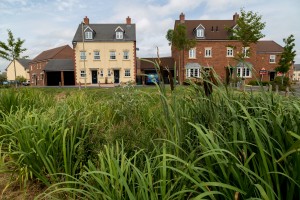New homes flood risk could be averted

The threat of flooding to homes and businesses will be higher due to the Government’s proposed house-building law, say water management experts and environment charities.
They’re concerned that, after heavy rain, the law will lead to stormwater running downhill off a million new houses by 2020 (the Government’s house-building target) and add to the pressure of flooding on existing low-lying properties.
So the experts and charities are supporting an amendment to the law, proposed by cross-party peers, which would enable new houses to be built without causing the additional flood risk.
The amendment would require developers to use the local land’s natural ability to soak in rainwater and let it drain away slowly, rather than directing the rainwater into already overwhelmed drains that lead to flood-affected areas downhill.
Wildfowl & Wetlands Trust (WWT) Head of Government Affairs, Dr Richard Benwell says:
“Everyone agrees we need more homes and less flooding. This amendment is clear common sense: sustainable drainage is a natural, affordable and effective way to create safer and greener communities.”
Examples of sustainable drainage systems, known as “SuDS”, include:
- Ponds, swales and greened areas – that hold and take up water, clean the water by filtering it, and create greener areas for people to enjoy and wildlife to live. Excess water percolates away slowly along streams or through the ground
- Green roofs, covered in soil and plants that also slow down and take up water
- Soakaway chambers and permeable paving – that use “hard” engineering to mimic these natural processes
Following the 2007 floods, the Pitt Review recommended that all new developments should use SuDS where possible. This was accepted by Parliament in 2010, but not implemented by government despite its own research suggesting SuDS could be cheaper than traditional drainage and every £1 spent could return up to £3 in benefits for water quality and lower flood risk.
- Amendment 119 to the Housing and Planning Bill is expected to be debated on 23 March in Committee and again at Report Stage. The amendments stand in the name of Lady Parminter, Lady Young, Lord Greaves, and Lord Krebs, Chair of the Adaptation Sub-Committee to the Committee on Climate Change.
- The amendment, and this press release, are supported by Angling Trust, Buglife, Chartered Institute of Water and Environmental Management (CIWEM), Rivers Trust, Salmon & Trout Conservation UK and Wildfowl & Wetlands Trust (WWT).
- DEFRA Impact Assessments showed that sustainable drainage is often cheaper than conventional alternatives, even without including flood defence, water quality, biodiversity and amenity benefits.
- There are at least 20,000 combined sewer overflows a year. Around 39 million tonnes of untreated waste water has overflowed 50 to 60 times a year into the Thames. Flood damage in England already costs £1.3–£2.2 billion per year.
- Despite the benefits, an analysis of 100 planning applications in areas of flood risk found less than 15 per cent incorporated sustainable drainage measures (analysis by the Committee on Climate Change’s Adaptation Sub Committee).



